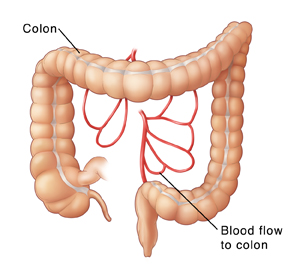Ischemic colitis happens when blood flow to the colon is reduced or blocked. You may have bloody diarrhea and severe belly pain. Other symptoms are vomiting, fever, and fainting. Diarrhea can lead to severe dehydration. This is the rapid loss of the fluids your body needs to work correctly. Because of the severe pain and the risk for dehydration, this health problem should be treated right away.
Causes of ischemic colitis
Experts aren't sure what causes ischemic colitis. The condition is more likely in people with blood clotting problems or heart and vascular disease.
Diagnosing ischemic colitis
Your healthcare provider will do a physical exam and ask about your symptoms. You may need certain tests to help find out the cause of your colitis. These may include:
-
Lab tests. Lab studies are routinely ordered during evaluation. These tests include a complete blood count (CBC), metabolic panel, and coagulation studies. These tests do not diagnose ischemic colitis. But they help in figuring out the severity of the disease.
-
Colonoscopy. This test helps rule out other colon problems. It uses a thin, flexible scope with a light and camera on the end. Your provider puts the scope into the rectum to the colon. The scope sends pictures from inside the colon to a video screen. A small tissue sample (biopsy) from the colon may be taken for testing in a lab.
-
Other tests such as a CT scan. These are detailed X-rays done to check the belly.
Treating ischemic colitis
Episodes are treated in the hospital. You may stay in the hospital for a few days or longer:
-
An IV (intravenous line) is put into a vein in your hand or arm. You'll be given fluids through the IV to treat dehydration. You're also given IV pain medicines or other types of medicines if you need them.
-
You may be given IV antibiotics. These medicines treat infection.
-
To rest the bowel, you won't eat or drink for a few days. In rare cases, when symptoms are very severe, you'll be given nutrition through the IV.
-
If you lost a lot of blood during the episode, you may get a blood transfusion.
-
In rare cases, an episode causes severe damage to the colon. In this case, surgery may be needed to take out the damaged part. Your provider can tell you more.
Follow-up
While you're being treated, your healthcare provider will work to find the cause of your ischemic colitis. After you get better, you may need to make lifestyle changes, such as quitting smoking. You may also have to take medicines to lower your risk of another episode. Call 911 if your symptoms come back.


